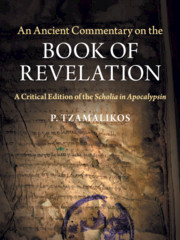Book contents
- Frontmatter
- Contents
- Preface
- Exordium
- Abbreviations
- Introduction
- Part I Text of Revelation and Scholia in Apocalypsin
- Part II Expanded Notes to the Scholia
- Expanded Notes to Scholion I
- Expanded Notes to Scholion II
- Expanded Notes to Scholion III
- Expanded Notes to Scholion IV
- Expanded Notes to Scholion V
- Expanded Notes to Scholion VI
- Expanded Notes to Scholion VII
- Expanded Notes to Scholion VIII
- Expanded Notes to Scholion IX
- Expanded Notes to Scholion X
- Expanded Notes To Scholion XI
- Expanded Notes to Scholion XII
- Expanded Notes to Scholion XIII
- Expanded Notes to Scholion XIV
- Expanded Notes to Scholion XV
- Expanded Notes to Scholion XVI
- Expanded Notes to Scholion XVII
- Expanded Notes to Scholion XVIII
- Expanded Notes to Scholion XIX
- Expanded Notes to Scholion XX
- Expanded Notes to Scholion XXI
- Expanded Notes to Scholion XXII
- Expanded Notes to Scholion XXIII
- Expanded Notes to Scholion XXIV
- Expanded Notes to Adnotatio Post Scholion XXIV
- Expanded Notes to Scholion XXV
- Expanded Notes to Scholion XXVI
- Expanded Notes to Scholion XXVII
- Expanded Notes to Scholion XXVIII
- Expanded Notes to Scholion XXIX
- Expanded Notes to Scholion XXX
- Expanded Notes to Scholion XXXI
- Expanded Notes to Scholion XXXII
- Expanded Notes to Scholion XXXIII
- Expanded Notes to Scholion XXXIV
- Expanded Notes to Scholion XXXV
- Expanded Notes to Scholion XXXVI
- Expanded Notes to Scholion XXXVII
- Expanded Notes to Scholion XXXVIII
- Expanded Notes to Scholion XXXIX
- Bibliography
- Index of authors cited in the scholia
- Index of Names in the Scholia
- Index of terms in the scholia
- Biblical citations in the scholia
- Index of modern authors
- General index
Expanded Notes To Scholion XI
from Part II - Expanded Notes to the Scholia
Published online by Cambridge University Press: 05 August 2014
- Frontmatter
- Contents
- Preface
- Exordium
- Abbreviations
- Introduction
- Part I Text of Revelation and Scholia in Apocalypsin
- Part II Expanded Notes to the Scholia
- Expanded Notes to Scholion I
- Expanded Notes to Scholion II
- Expanded Notes to Scholion III
- Expanded Notes to Scholion IV
- Expanded Notes to Scholion V
- Expanded Notes to Scholion VI
- Expanded Notes to Scholion VII
- Expanded Notes to Scholion VIII
- Expanded Notes to Scholion IX
- Expanded Notes to Scholion X
- Expanded Notes To Scholion XI
- Expanded Notes to Scholion XII
- Expanded Notes to Scholion XIII
- Expanded Notes to Scholion XIV
- Expanded Notes to Scholion XV
- Expanded Notes to Scholion XVI
- Expanded Notes to Scholion XVII
- Expanded Notes to Scholion XVIII
- Expanded Notes to Scholion XIX
- Expanded Notes to Scholion XX
- Expanded Notes to Scholion XXI
- Expanded Notes to Scholion XXII
- Expanded Notes to Scholion XXIII
- Expanded Notes to Scholion XXIV
- Expanded Notes to Adnotatio Post Scholion XXIV
- Expanded Notes to Scholion XXV
- Expanded Notes to Scholion XXVI
- Expanded Notes to Scholion XXVII
- Expanded Notes to Scholion XXVIII
- Expanded Notes to Scholion XXIX
- Expanded Notes to Scholion XXX
- Expanded Notes to Scholion XXXI
- Expanded Notes to Scholion XXXII
- Expanded Notes to Scholion XXXIII
- Expanded Notes to Scholion XXXIV
- Expanded Notes to Scholion XXXV
- Expanded Notes to Scholion XXXVI
- Expanded Notes to Scholion XXXVII
- Expanded Notes to Scholion XXXVIII
- Expanded Notes to Scholion XXXIX
- Bibliography
- Index of authors cited in the scholia
- Index of Names in the Scholia
- Index of terms in the scholia
- Biblical citations in the scholia
- Index of modern authors
- General index
Summary
EN XIa: τὸ σύνθετον ζῷον
Like διαίρεσις νοητῶν (Scholion XXV), the expression ‘a composite animal’ comes from Alexander of Aphrodisias and was taken up by Didymus. It can be traced in Philo, and Justin is the first Christian author to style a human being a σύνθετον ζῷον. It does not appear in Origen, yet the idea is there. Since the designation of man as a ‘composite animal’ (σύνθετον ζῷον) is otherwise almost absent from Christian literature, its presence in this Scholion points to Didymus. The same idea occurs in Pseudo-Caesarius, whom I have identified with Cassian himself. Quaestiones et Responsiones, 174: ἄμφω γὰρ κτιστά, ἥ τε ψυχὴ καὶ τὸ σῶμα καὶ σύνθετα τῇ πρὸς ἄλληλα συναφείᾳ καὶ κοινωνίᾳ· συνθέσει δὲ πάντως ἕπεται διάστασις καὶ διαίρεσις.
A ‘composite animal’ (σύνθετον ζῷον) may also mean an animal consisting of different material ‘elements’ (fire, air, water, dust, etc.), referring not only to humans, but to any animal, even plants.
- Type
- Chapter
- Information
- An Ancient Commentary on the Book of RevelationA Critical Edition of the Scholia in Apocalypsin, pp. 242 - 247Publisher: Cambridge University PressPrint publication year: 2013



